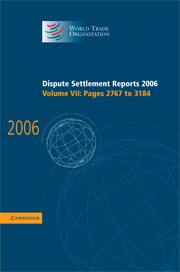European Communities – Measures Affecting the Approval and Marketing of Biotech Products (WT/DS291, WT/DS292, WT/DS293): Table of Annexes G to I-2
Published online by Cambridge University Press: 13 December 2017
Summary
REPLIES BY AUSTRALIA TO QUESTIONS POSED BY THE PANEL AND THE PARTIES
QUESTIONS POSED BY THE PANEL
For all third parties:
With reference to pp. 27-36 of the EC first written submission, could the third parties please indicate whether the European Communities’ description of their own regulatory systems is accurate?
From Australia's perspective, the accuracy of the European Communities’ description of the Australian regulatory system does not appear to be of any relevance to the resolution of this dispute. Australia therefore does not wish to provide any response addressing the accuracy of this description.
For all complaining parties
With reference to Article 5.7 of the SPS Agreement, do the complaining parties agree with the European Communities that:
(a) Article 5.7 excludes the applicability of Article 5.1 and is not an exception (affirmative defence) to Article 5.1 (EC first written submission, para. 575)? In answering this question, please address the relevance of the Appellate Body reports on Japan- Apples (footnote 316), EC – Hormones (para. 104) and ECSardines (para. 275) and Japan-Agricultural Products II (paras. 86 et seq)?
In Australia's view, Article 5.7 operates as a qualified exemption from the obligation under Article 5.1. Article 5.7 is not, however, an exception (affirmative defence) and the burden of proof in establishing a claim of inconsistency with Article 5.7 rests with the complaining party.
Qualified exemption
In Japan – Agricultural Products II, the Appellate Body explained that:
Article 5.7 operates as a qualified exemption from the obligation under Article 2.2 not to maintain SPS measures without sufficient scientific evidence. An overly broad and flexible interpretation of that obligation would render Article 5.7 meaningless.
In light of the nexus between Articles 2.2 and 5.1, Australia considers that the same reasoning can be applied to the relationship between Article 5.1 and Article 5.7: Article 5.7 operates as a qualified exemption from the obligation under Article 5.1 requiring Members to ensure their SPS measures are based on an assessment of risk.
- Type
- Chapter
- Information
- Dispute Settlement Reports 2006 , pp. 2769 - 3184Publisher: Cambridge University PressPrint publication year: 2008
- 1
- Cited by



